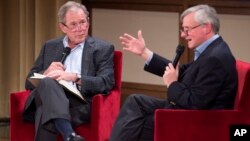For all eight years of his son’s presidency, former President George Herbert Walker Bush was supportive.
But in a new book about his life in politics, President George Herbert Walker Bush mildly criticizes his son, George Walker Bush.
The elder Bush says he approves of some of his son’s controversial decisions, such as invading Iraq. But sometimes his son used overly “hot rhetoric,” the senior Bush says.
George H.W. Bush mentioned a 2002 speech describing an “axis of evil.”
In the speech George W. Bush said Iran, North Korea and Iraq were among the nations that fit the “axis of evil” description.
Tough talk will get you headlines, “but it doesn’t necessarily solve the diplomatic problem,” George H.W. Bush said.
His comments came in Jon Meacham’s new book, “Destiny and Power.”
George H.W. Bush served as president from 1989 to 1993. George W. Bush was the U.S. president from 2001 to 2009. George H.W. Bush was the 41st president of the United States. His son, George W. Bush, was number 43.
In the interviews with Meacham, George H.W. Bush says his son was not well served by two of his administration’s top officials – Vice President Dick Cheney and Defense Secretary Donald Rumsfeld.
Both had “iron-ass views,” the senior Bush said.
By that, Bush meant he believed the two officials were acting too tough in dealing with threats to the United States after the 2001 terrorist attacks.
Cheney and Rumsfeld served as President George W. Bush’s key advisors. They promoted U.S. military action overseas after the 9/11 terrorist attacks on New York City and Washington. They pushed for U.S. war efforts in Afghanistan and Iraq.
Cheney “had his own empire there and marched to his own drummer,” Bush said.
Rumsfeld was an “arrogant fellow,” he said.
The younger Bush said in a statement that he was “proud to have served" with Cheney and Rumsfeld. He said both "did a good job for him and the American people.”
Over the weekend, George W. Bush talked about the book with its author, Jon Meacham. The discussion was broadcast from his presidential library in Texas.
Bush expressed surprise at some of the book’s disclosures. He said he hadn’t seen the diaries his dad kept -- the ones that Meacham used to write the book.
But George W. Bush said proudly that his dad strongly supported his most controversial decision – the one to go to war with Iraq in 2003. At Meacham’s urging, the younger Bush read aloud a letter from his father. The elder Bush wrote about how proud he was of his son’s leadership in dealing with Iraq.
Another George H.W. Bush son, Jeb, is running for the 2016 Republican presidential nomination.
I'm Anne Ball.
Zlatica Hoke reported on this story for VOANews.com. Bruce Alpert adapted it for Learning English. Kathleen Struck was the editor.
We want to hear from you. Write to us in the Comments section or comment on our Facebook page.
_______________________________________________________________
Words in This Story
controversial – v. relating to or causing much discussion, disagreement, or argument
rhetoric -- n. language that is intended to influence people and that may not be honest or reasonable definition
promoted -- v. to help (something) happen, develop, or increase
arrogant -- adj. having or showing the insulting attitude of people who believe that they are better, smarter, or more important than other people





